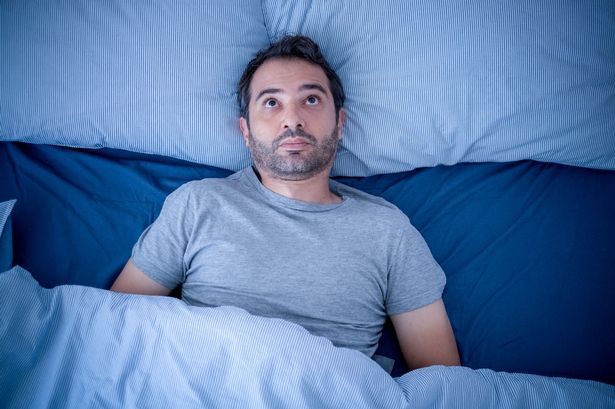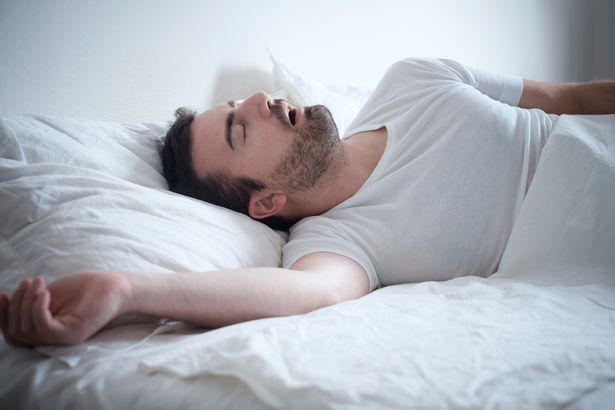A study has found that people who do this habit are more likely to have uncontrolled blood pressure. This night time habit could lead to a stroke or heart failure.(Image: Getty Images)
This night time habit could lead to a stroke or heart failure.(Image: Getty Images)
A huge study has revealed one common night time habit that could be an early indicator of having heart failure or a stroke. In the largest research of its kind, this study highlights that people who are more prone to this condition may suffer from dangerous hypertension.
Carried out by sleep specialists at Flinders University, the research found that people who regularly snore at night are more likely to have a raised blood pressure, which can lead to a variety of dangerous conditions. This was particularly noticed in overweight middle-aged men.
This important study was the first to involve multiple night home-based monitoring technologies over a long period of time, reports Surrey Live. This was done to investigate the connection between snoring and blood pressure.
With the results published in the Nature Digital Medicine journal, researchers emphasised the importance of considering snoring as a factor when it comes to healthcare and treatment of patients.
 Snoring can lead to higher blood pressure.(Image: Getty Images)
Snoring can lead to higher blood pressure.(Image: Getty Images)
Dr Bastien Lechat from the College of Medicine and Public Health, said: “For the first time, we can objectively say that there is a significant link between regular nighttime snoring and high blood pressure.
“We found that 15 per cent of all participants in the study, who were primarily overweight men, snore for more than 20 per cent of the night on average and that this regular nightly snoring is associated with elevated blood pressure and uncontrolled hypertension.
“These results emphasise the importance of considering snoring as a factor in healthcare and treatment for sleep-related issues, particularly in managing hypertension.”
While snoring can be considered a common habit by many, it can also come with a variety of detrimental health effects. For example, snoring can often occur at the same time as sleep apnoea, which is a condition where a person will have abrupt pauses in their breathing while they sleep.
Senior author Professor Danny Eckert, Director of Sleep Health at Flinders University, explained: “We found that those who snore regularly had almost double the risk of uncontrolled hypertension. This risk nearly doubled again in individuals who snored regularly and suffered from sleep apnoea compared to those who didn’t snore regularly.”
 Snoring can prevent you and those around you from sleeping properly.(Image: Getty Images)
Snoring can prevent you and those around you from sleeping properly.(Image: Getty Images)
Another study, which involved 72,269 people aged 40 to 79 from the UK Biobank study, looked into how the times you go to sleep and wake up can impact your health and wellbeing.
While it did not share how close you need to be to the same consistent sleep and wake up times, they found that the further away you are, the greater the risk of harm. These results were published in the Journal of Epidemiology and Community Health.
Lead author Jean-Phillipe Chaput, from the University of Ottawa, said: “We should aim to wake up and go to sleep within 30 minutes of the same time each night and each morning, including weekends. Within an hour of the same time is good but less good than 30 minutes, and even better is to have zero variation.
“Beyond an hour’s difference each night and each morning means irregular sleep. That can have negative health impacts. The closer you are to zero variation the better.
“No one is perfect across a whole year, and if you don’t have a regular sleep pattern for one or two days a week, it’s not going to kill you. But if you repeatedly have irregular sleep, five or six days a week, then it becomes chronic, and that is a problem.”
While snoring can be an indicator of high blood pressure, the poor quality of sleep that can come as a side effect can in some cases lead to a heightened risk of developing hypertension.
Otherwise known as prolonged high blood pressure, this condition can lead to serious health issues, including heart failure, heart disease, stroke and kidney failure.
The snoring study involved analysing data from sleep trackers that were placed underneath mattresses to monitor sleep apnoea and snoring. Also using FDA-registered home blood pressure machines, this study took place over nine months and involved over 12,000 global participants.
Dr Lechat said: “This is the largest study to date investigating the potential relationships between snoring, sleep apnoea and hypertension using objective assessments in people’s homes, and it reveals important insights into the potential consequences of snoring on hypertension risk.”
 Join the Daily Record WhatsApp community!
Join the Daily Record WhatsApp community!
Get the latest news sent straight to your messages by joining our WhatsApp community today.
You’ll receive daily updates on breaking news as well as the top headlines across Scotland.
No one will be able to see who is signed up and no one can send messages except the Daily Record team.
All you have to do is click here if you’re on mobile, select ‘Join Community’ and you’re in!
If you’re on a desktop, simply scan the QR code above with your phone and click ‘Join Community’.
We also treat our community members to special offers, promotions, and adverts from us and our partners. If you don’t like our community, you can check out any time you like.
To leave our community click on the name at the top of your screen and choose ‘exit group’.
If you’re curious, you can read our Privacy Notice.
The research wants healthcare to acknowledge the significance of snoring within clinical practice and sleep disorder management – especially for controlling high blood pressure.
The doctor continued: “The findings of this study pave the way to further investigate whether therapeutic interventions directed toward snoring can reduce hypertension and reduce the risks associated with it.”
The NHS has given out top tips of what to do and what not to do in order to stop snoring. However, if you are experiencing negative impacts on your sleep, such as poor sleep quality, excessive fatigue or breathing issues, it is advised to see your GP.
NHS tips to stop snoring:
- try to lose weight if you’re overweight.
- sleep on your side – try taping or stitching a tennis ball to the back of your sleepwear, or buy a special pillow or bed wedge to help keep you on your side.
- consider asking your partner to use earplugs if your snoring affects their sleep.
NHS tips of what not to do if you want to stop snoring:
- do not smoke.
- do not consume excessive alcohol.
- do not take sleeping pills – these can sometimes cause snoring.
